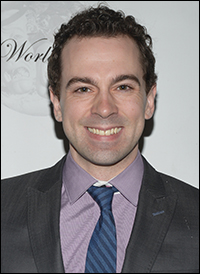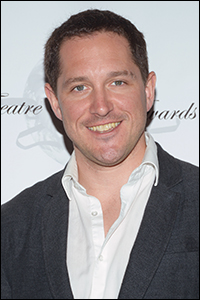
This made a smashing introduction to the evening. The awards have been presented annually since 1945, saluting twelve performers for outstanding debut performances. This is in connection with "Theatre World," the invaluable photo-studded book which chronicles not only Broadway but Off, Off-Off and regional theatres around the country. Past winners of the award — which predates the Tonys — have included Marlon Brando, Paul Newman, Burt Lancaster, George C. Scott, Jason Robards, John Cullum, Al Pacino, Hugh Jackman, Philip Seymour Hoffman, Robert Redford, Julie Andrews, Anne Bancroft, Linda Lavin, Bernadette Peters, Maureen Stapleton, Geraldine Page, Rosemary Harris, Judy Holliday, Julie Harris, Carol Channing and Meryl Streep.
The Theatre World Award differs from other annual awards in that the winners are not in direct competition with each other. Thus, two of this year's nominees for the Best Actor in a Musical both deserved — and received — awards. Three of the twelve winners were selected for work Off-Broadway. What immediately became clear in the ceremony, which was written and entertainingly hosted by author and columnist Peter Filichia, directed by John Tartaglia (Avenue Q), was the feeling of community among the winners, past and present.
| |
 |
|
| Rob McClure | ||
| photo by Monica Simoes |
This type of closeness was seen in the next award, when Courtney B. Vance presented the award to his Lucky Guy castmate Tom Hanks (who joked that he was receiving an award for his Broadway debut despite being "56, with the knees and hips to prove it"). Hanks charmed the crowd, asking, "How can you be an actor and not want to be on Broadway?" and suggested that this debut award hinted at more to come, "and I really hope so." In keeping with the community theme of the evening, Hanks raised the specter of James Earl Jones — a 1962 winner, who in 1987 presented the same award to his Fences castmate, Vance.
| |
 |
|
| Bertie Carvel | ||
| Photo by Monica Simoes |
Other winners included Bertie Carvel of Matilda, presented by Daniel Gerroll (Slab Boys); Valisia LeKae of Motown, presented by Tartaglia; Conrad Ricamora of Here Lies Love, presented by Lea Salonga (who described how impressed she was watching Ricamora when he was in the ensemble of the tryout of her upcoming show, Allegiance); Carrie Coon of Who's Afraid of Virginia Woolf?, who turned out to be very much unlike her performance of Honey might lead you to expect, presented by Jennifer Lim (Chinglish); Keala Settle of Hands on a Hardbody, presented by close friend and mentor Tony Sheldon (Priscilla, Queen of the Desert); Yvonne Strahovski of Golden Boy, presented by Christine Lahti (who received her award for the early Mamet play, The Woods); Shalita Grant of Vanya and Sonia and Masha and Spike, who gave an especially touching speech, presented by Jackie Hoffman; and Tom Sturridge of the little-seen Orphans, presented by Thom Christopher (Noël Coward in Two Keys).
The several entertainment segments — from past winners Wesley Taylor (Rock of Ages), Philip Boykin (Porgy and Bess) and Isabel Keating (The Boy from Oz) — were less than helpful, as the intermissionless evening ran past the 2:40 mark. Otherwise, the presentation was well put together, altogether lovely, and marked by heartfelt acceptance speeches without the usual award-show pressure of a stopwatch. Filichia also took the time to introduce past winners in the audience, including one of the awardees from the first ceremony in 1945, Bambi Linn of Carousel. As a novel touch, the little girls presenting the awards were not the four Matildas; rather, Jillian Lebling and Eliza Holland Madore came over from Once, across the street.
Highlights of the evening included two special presentations. The Dorothy Loudon Award, honoring the beloved actress and 1963 winner, went to Jonny Orsini of The Nance. Nathan Lane, his costar and apparently an enormous fan of the young actor, lavished praise on Orsini while pointing out that he, himself, never received a Theatre World Award. He also garnered the evening's biggest laugh, when he entered through the Pippin circus tent and said, "I love this set, I feel like I'm in Madonna's bedroom." The evening was capped with a standing ovation as Alan Alda won the John Willis Award for Lifetime Achievement. Alda described how winning the award at the start of his career — in 1964, for the one-week flop Fair Game for Lovers — meant so much to him as he struggled to maintain an acting career, a sentiment echoed by many of the winners past and present.
(Steven Suskin is author of "Show Tunes," “The Sound of Broadway Music: A Book of Orchestrators and Orchestrations,” “Second Act Trouble,” the "Broadway Yearbook" series and the “Opening Night on Broadway” books. He can be reached at [email protected].)










